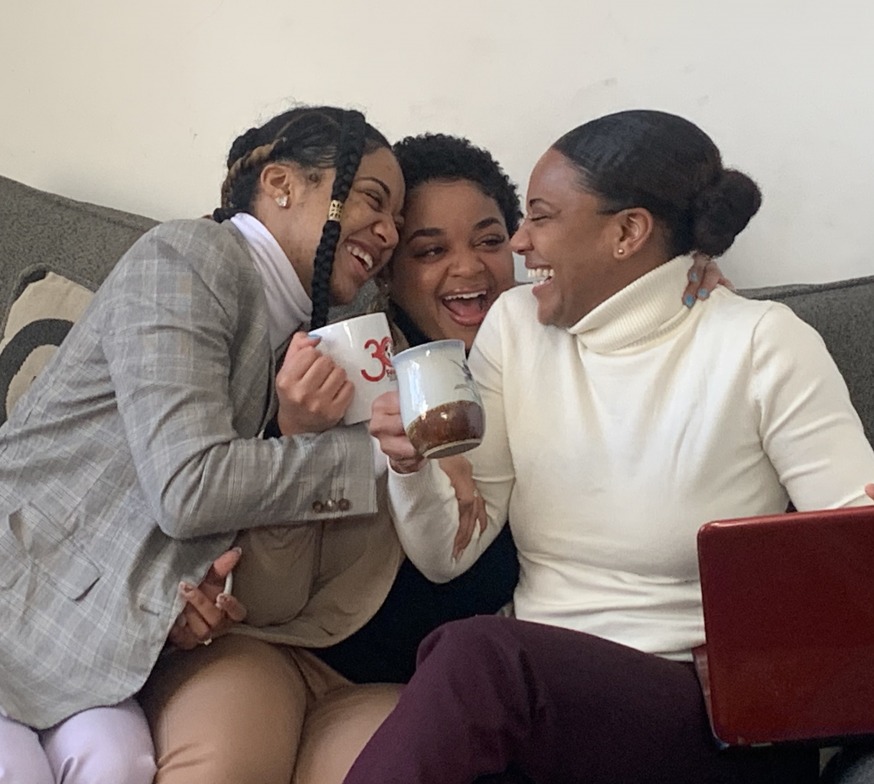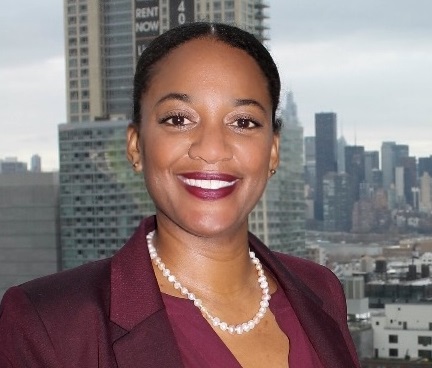
Ebony Young and Family (Photo: Young For Queens)
Feb. 28, 2021 By Ebony Young
My history is rich, golden, and rooted in strong resilient people, and is a source of great pride.
Each February, the strength, tenacity, and dogged perseverance that is the history of African American people is recognized as a time of honor and inspiration around the world.
Yet this month encompasses more than just joy, especially to those of us who live black, wake up black, walk the streets black, and show up in corporate America black.
WE confront a different experience during this month of celebration.
While most only read to understand more about black history, those who have lived through times of devastation including ancestral trials, slavery, rape, molestation, maternal inequities, and so much more, WE see differently.
Much of the pain stems from the inability to be viewed as, and treated, equally. This is a pain that haunts us to this day.
Miseducation plays a major role in many of the inequities that persist. Many American public schools offer only sanitized versions of slavery and the Civil Rights movement, along with biographies of a handful of figures who Dr. Martin Luther King Jr. called “palatable to white audiences.”
The American education system offers very little information about the long list of accomplishments of African American people.
If you are a parent who does not have black children, imagine your non-black child coming home with a handful of books that only show black people and their experiences alone. What kind of impact would that have on your non-black child?
Imagine them not experiencing a world filled with the great accomplishments and successes of role models who looked just like them? What would those subliminal messages do to your child? Would that impact them as adults?
Black children are regularly exposed to an imbalanced representation of faces and people who look like them in their history, science, math, and English books. Thus, this traumatic experience subconsciously feeds their brains negative thoughts about themselves.
Now, imagine your child being educated in spaces in which 80 percent of the time, negative and painful representations are primarily reflected through images of people who look like them.
The school system is wrought with inequities that face our children of color. As a mother of two daughters in our public school system, I find this deeply concerning. An October 2020 article by Danielle Dreilinger of The Hechinger Report called “America’s gifted education programs have a problem. Can it be fixed?” brings light to one of the inequities against black students in education.
The article points out that “nearly 60 percent of students in gifted education are white, according to the most recent federal data, compared to 50 percent of public school enrollment overall. Black students, in contrast, made up 9 percent of students in gifted education, although they were 15 percent of the overall student population.”
Other inequities against students of color:
• zero or limited broad band access and internet bandwidth (made more prevalent during the
pandemic)
• a splintered pipeline to gain admittance to specialty high schools
These polarities have halted growth in the black community, and something must be done. The
disparities that currently sit at the core of our problems remain.
The time is now! Everybody must play a role in eradicating injustice by shifting the black American narrative to focus on economic empowerment, social equity, and community well-being. Education reform is imperative.
Updating the curriculum of public schools to reflect the advances and contributions of black people throughout American History by acknowledging visionaries like Dr. Shirley Ann Jackson, a theoretical physicist, Marie Van Brittan Brown, inventor of the home security system, Otis Boykin, who improved the pacemaker, Charles Drew, a physician and medical researcher, Marian Croak, inventor of VoIP, Lisa Gelobter, a trailblazer in web animation who designed a program that was ultimately used in the creation of the GIF.
Our educational system should also trumpet economic advancement by training students on how to effectively build credit, the importance of investments and budgeting, and provide them with the skills to lead whole and balanced lives.
If elected as council member, I will go to city hall with the agenda of equality and access for all regardless of skin color.
Every child deserves the best education and experience possible so I would fight for:
• a better process for students to enter the gifted and talented programs such as measuring
disadvantaged kids against other kids like them,
• partnerships with corporations to decrease the digital divide,
• a better tracking method and pipeline to specialty high schools,
• curricula that tells the whole American story, including the contributions of people of color,
• coalitions to educate about and prevent hate crimes against our children of color, and
• more foreign language courses to be electives in our local schools.
We can all be involved in making a difference. Join me in taking action! BE the tutor, mentor, educator, planner, guardian, listener, and changemaker. BE The reason WHY our students desire to impact the world.
Our district is home to many non-profits and local organizations that would benefit from your help. Long Island City YMCA, Pursuit, LIC Relief, Sunnyside Community Services, The Black Entrepreneur Initiative, Urban Upbound, 696 Build-Queensbridge, and Culture Lab are just a few of the many organizations for you to explore and get involved with.
Let’s build TOGETHER!
Ebony Young is a candidate for City Council District 26, which covers the neighborhoods of Sunnyside, Woodside, Long Island City and parts of Astoria
3 Comments


Blacks aren’t the only minority in our school systems. Some races just don’t victimize themselves and use the race card for perceived inequalities. Basic math and science hasn’t changed for over 100 years, so why politicize education? A lot of people now a days feel sending their kids to school is all that it takes for them to be successful, but education should continue at home. If the NBA isn’t lowering their standards, why should schools?
I took the specialized high school test. I didn’t pass it. This had nothing to do with my race. I was simply not smart enough to pass it. It’s that simple. Woke rhetoric has gotten out of control. This reads like satire.
Blacks aren’t the only students of color. The curriculum can’t be that flawed that other races can succeed. This isn’t a race issue, its culture. Some cultures tend to value education more and have their kids work hard. G&T and specialized schools aren’t entitlements, and there is no room for affirmative action in education.